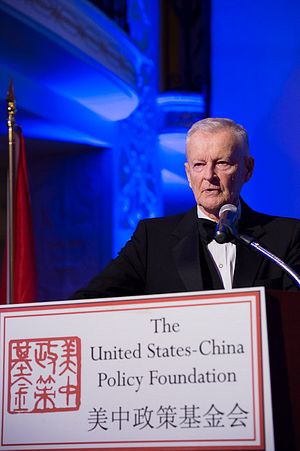Dr. Zbigniew Brzezinski passed away on May 26. In the wake of his passing, I was initially surprised by how little fanfare surrounded the news of his death, but perhaps I shouldn’t have been. After all, Dr. Brzezinski had always been a humble and private man, not seeking praise or attention for his countless accomplishments. His legacy, however, should not be forgotten. The impact he made on the United States and China should be remembered and given the attention it deserves.
Dr. Brzezinski should be remembered as a respected political strategist, influential adviser, and global scholar. He pursued his endeavors with great integrity, honesty, and humility. Some of his key accomplishments can best be embodied by the text of the Presidential Medal of Freedom awarded to him by President Jimmy Carter in 1981, which read:
Zbigniew Brzezinski served his country and the world. An author and architect of world affairs, his strategic vision of America’s purpose fused principle with strength. His leadership has been instrumental in building peace and ending the estrangement of the Chinese and American people. But above all, he helped set our nation irrevocably on a course that honors America’s abiding commitment to human rights.
For me, Dr. Brzezinski will always be synonymous with the U.S.-China normalization. While much attention, deservedly so, is given to the roles of Dr. Henry Kissinger and President Richard Nixon in opening ties with China and to Carter for officially normalizing ties, the pivotal part Dr. Brzezinski played is so often overlooked. I had the great honor of being familiar with the White House administration during Carter’s presidency and saw the effects of Dr. Brzezinski’s influence on Carter’s China policy.
At the time, I was good friends with Michel Oksenberg (1938-2001), who served under Dr. Brzezinski in Carter’s National Security Council as the Asian affairs adviser. During his time at the National Security Council, Oksenberg and I often got together and talked about U.S.-China relations. From these conversations, it was clear that Oksenberg and Brzezinski both supported normalization, assuming they could find a way to resolve the question of the U.S. relationship with Taiwan. They also hoped to promote people-to-people exchanges and increase the number of Chinese students studying in the United States.
Brzezinski worked with Carter, Oksenberg, and Leonard Woodcock, chief of the U.S. Liaison Office in Beijing, to move forward with normalization. These four individuals created the environment and strategy necessary for normalization to finally be possible. In May 1978, Dr. Brzezinski insisted on traveling to China. During his meetings with China’s Deng Xiaoping, the conditions for handling the U.S. relationship with Taiwan post normalization were discussed.
Finally, in December 1978, the United States and China made joint announcements that the establishment of official diplomatic relationships would occur on January 1, 1979. When Deng Xiaoping visited the United States just after the normalization, he had a special dinner at Dr. Brzezinski’s home, showing how appreciative Deng was of Brzezinski’s efforts. Without Dr. Brzezinski’s tireless behind-the-scenes work, it is doubtful normalization would have occurred so soon.
After leaving the government, Dr. Brzezinski maintained his expertise on U.S.-China relations and continued to provide his astute insights into the relationship. The U.S.-China Policy Foundation (USCPF) was honored to welcome Dr. Brzezinski as our keynote speaker at our Annual Gala Dinner in 2012. It was gratifying to see that Dr. Brzezinski’s interest in maintaining strong U.S.-China relations had not faltered over the years. His continuous scholarship and efforts were a tribute to his dedication and passion. Dr. Brzezinski will be missed and he will definitely be remembered.
Professor Chi Wang is President and Chair of the U.S.-China Policy Foundation.

































